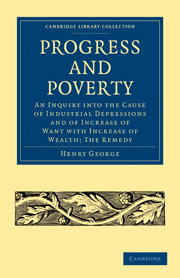 Progress and Poverty
Progress and Poverty Book contents
- Frontmatter
- PREFACE TO FOURTH EDITION
- Contents
- INTRODUCTORY
- BOOK I WAGES AND CAPITAL
- BOOK II POPULATION AND SUBSISTENCE
- BOOK III THE LAWS OF DISTRIBUTION
- BOOK IV EFFECT OF MATERIAL PROGRESS UPON THE DISTRIBUTION OF WEALTH
- Chapter I The dynamics of the problem yet to seek
- Chapter II Effect of increase of population upon the distribution of wealth
- Chapter III Effect of improvements in the arts upon the distribution of wealth
- Chapter IV Effect of the expectation raised by material progress
- BOOK V THE PROBLEM SOLVED
- BOOK VI THE REMEDY
- BOOK VII JUSTICE OF THE REMEDY
- BOOK VIII APPLICATION OF THE REMEDY
- BOOK IX EFFECTS OF THE REMEDY
- BOOK X THE LAW OF HUMAN PROGRESS
- CONCLUSION
- INDEX
Chapter II - Effect of increase of population upon the distribution of wealth
Published online by Cambridge University Press: 07 September 2011
- Frontmatter
- PREFACE TO FOURTH EDITION
- Contents
- INTRODUCTORY
- BOOK I WAGES AND CAPITAL
- BOOK II POPULATION AND SUBSISTENCE
- BOOK III THE LAWS OF DISTRIBUTION
- BOOK IV EFFECT OF MATERIAL PROGRESS UPON THE DISTRIBUTION OF WEALTH
- Chapter I The dynamics of the problem yet to seek
- Chapter II Effect of increase of population upon the distribution of wealth
- Chapter III Effect of improvements in the arts upon the distribution of wealth
- Chapter IV Effect of the expectation raised by material progress
- BOOK V THE PROBLEM SOLVED
- BOOK VI THE REMEDY
- BOOK VII JUSTICE OF THE REMEDY
- BOOK VIII APPLICATION OF THE REMEDY
- BOOK IX EFFECTS OF THE REMEDY
- BOOK X THE LAW OF HUMAN PROGRESS
- CONCLUSION
- INDEX
Summary
The manner in which increasing population advances rent, as explained and illustrated in current treatises, is that the increased demand for subsistence forces production to inferior soil or to inferior productive points. Thus, if, with a given population, the margin of cultivation is at 30, all lands of productive power over 30 will pay rent. If the population be doubled, an additional supply is required, which cannot be obtained without an extension of cultivation which will cause lands to yield rent that before yielded none. If the extension be to 20, then all the land between 20 and 30 will yield rent, and have a value, and all land over 30 will yield increased rent and have increased value.
It is here that the Malthusian doctrine receives from the current elucidations of the theory of rent the support of which I spoke when enumerating the causes that have combined to give that doctrine an almost undisputed sway in current thought. According to the Malthusian theory, the pressure of population against subsistence becomes progressively harder as population increases, and although two hands come into the world with every new mouth, it becomes, to use the language of John Stuart Mill, harder and harder for the new hands to supply the new mouths.
- Type
- Chapter
- Information
- Progress and PovertyAn Inquiry into the Cause of Industrial Depressions and of Increase of Want with Increase of Wealth; The Remedy, pp. 207 - 219Publisher: Cambridge University PressPrint publication year: 2009First published in: 1881


